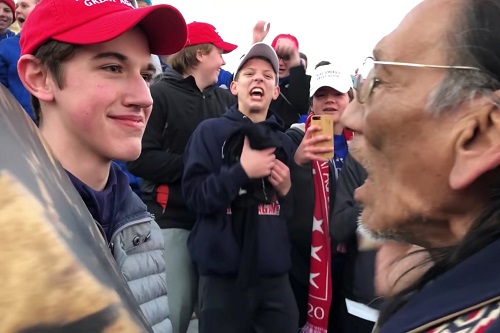Reuters photo
By
Howard Debs
Drumbeat
It started with the “Black Hebrew Israelites,” that is the
group’s name, shouting epithets at the boys
there before the Lincoln Memorial in the country’s capital.
No, it started in 1970 when four demonstrators
were killed by police trying to quell a Vietnam War
protest at Kent State University in Ohio.
No, it started in 1964 when three
civil rights workers two white, one black
were murdered in Mississippi by an angry mob.
No, it started in 1942 with the internment in California
and elsewhere of Japanese Americans during World War II.
It started in 1890 with the
slaughter of some say 250 Sioux at Wounded Knee—
it started with the beating of a drum.
O Great Spirit of my fathers,
this is my prayer.
Help me to feel your urge
and your message. Help me
to be just even to those that hate me;
and at all times help me to be kind.
If my enemy is weak and faltering
help me to the good thought that
I forgive him. If he surrender, move me
to help him as a weak and needy brother.(1)
It started with the boys taunting the Omaha tribe elder
there, beating his drum, singing his chants.
No, it started in June of 1969 with the police raid
on the Stonewall Inn in New York City.
No, it started in 1919 with the lynching
of 237 black sharecroppers in Arkansas.
No, it started in 1913 when Leo Frank, a Jew,
was wrongly tried in Atlanta for the murder
of Mary Phagan and later died at the hands of vigilantes.
No, it started in 1865 with the rise of the Ku Klux Klan
marauding through the South, killing as they went.
It started in 1863 when 280 Shoshone men,
women and children were slaughtered
during the Bear Creek Massacre in Idaho—
It started with the beating of a drum.
It started…
with the beating of a drum.
(1) selection adapted from The Gospel of the Redman, compiled by Ernest Thompson Seton, 1948, used with permission, World Wisdom, Inc.
The incident of which this poem speaks occurred Friday, January 18. Print and broadcast media have continued to focus attention on the incident as fresh video footage appeared regarding the confrontation between a teenage student and a Native American elder. The story is encapsulated in the already iconic photo depicting the two protagonists facing each other, a breath apart, each standing their ground, each in their own way. The picture is a visualization in part of hatred, but so too of a kind of fear of the otherness of another, a juxtaposition of alterity that must be viewed as the latest in a line of such behavior which goes very far back in time. Explanations have been attempted, about the psychology of it all, trying to fathom it all, without much thought as to how to resolve it all. It is the stuff of which genocides are fueled, those that have come before and those occurring as this is being written, not to mention those that are yet to come.
Howard Debs
Howard Richard Debs is a recipient of the 2015 Anna Davidson Rosenberg Poetry Awards. His essays, fiction, and poetry appear internationally in numerous publications; His book Gallery: A Collection of Pictures and Words, is a 2017 Best Book Awards and 2018 Book Excellence Awards recipient. He is co-editor of New Voices: Contemporary Writers Confronting the Holocaust forthcoming in 2019 from Vallentine Mitchell of London, publisher of the first English language edition of Anne Frank’s diary. He is listed in the Poets & Writers Directory: https://www.pw.org/content/howard_debs



No Comments Yet!
You can be first to comment this post!